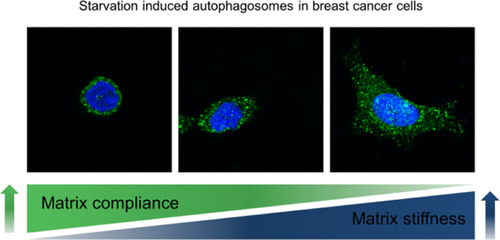当前位置:
X-MOL 学术
›
ACS Appl. Bio Mater.
›
论文详情
Our official English website, www.x-mol.net, welcomes your feedback! (Note: you will need to create a separate account there.)
Matrix Stiffness Regulates Chemosensitivity, Stemness Characteristics, and Autophagy in Breast Cancer Cells
ACS Applied Bio Materials ( IF 4.7 ) Pub Date : 2020-06-26 , DOI: 10.1021/acsabm.0c00448 Yan Li 1 , Rotsiniaina Randriantsilefisoa 1 , Jie Chen 1 , Jose Luis Cuellar-Camacho 1 , Wanjun Liang 1 , Wenzhong Li 1
ACS Applied Bio Materials ( IF 4.7 ) Pub Date : 2020-06-26 , DOI: 10.1021/acsabm.0c00448 Yan Li 1 , Rotsiniaina Randriantsilefisoa 1 , Jie Chen 1 , Jose Luis Cuellar-Camacho 1 , Wanjun Liang 1 , Wenzhong Li 1
Affiliation

|
The biomechanical environment of natural or synthetic extracellular matrices (ECMs) is identified to play a considerable role in embryonic development in stem cell fate and also in cancer development and fibrotic diseases. However, rare evidence shows the impact of biomechanical signals such as ECM stiffness on cancer cell stemness and autophagy, which makes huge contributions to cancer and many developmental and physiological processes. Furthermore, the influence and mechanism of ECM stiffness on autophagy in cancer cells remains unclear. Herein, we employed fibronectin-coated polyacrylamide hydrogels as the substrates for culturing breast cancer cells. We found that a soft environment was beneficial for the maintenance of cancer stem cell (CSC) population in breast cancer cells, which likely led to aggravated chemoresistance. Conversely, nutritional deprivation-induced autophagy was elevated along with increasing matrix stiffness. In addition, we found that though the central regulator of mechanotransduction, the yes-associated protein, YAP, was beneficial for autophagy activation, unexpectedly, it was not the main cause of rigid substrate promoting autophagy. In contrast, the YAP was crucial for a compliant environment for maintaining breast cancer stem cells and promoting chemotherapeutic resistance. We also found that the Rho-ROCK-ERK signal pathway and actin cytoskeleton were essential for the regulation of autophagy by matrix stiffness. Taken together, our study showed the important influence of ECM stiffness on stemness and autophagy in breast cancer cells and revealed the possible signal pathway involved in the mechanotransduction in autophagy activation, which provides significant implications for the study of cancer progression and design of hydrogels for tissue engineering in clinical therapy.
中文翻译:

基质刚度调节乳腺癌细胞的化学敏感性、干性特征和自噬
天然或合成细胞外基质 (ECM) 的生物力学环境被确定在干细胞命运的胚胎发育以及癌症发展和纤维化疾病中发挥重要作用。然而,罕见的证据表明生物力学信号(如 ECM 刚度)对癌细胞干性和自噬的影响,这对癌症以及许多发育和生理过程做出了巨大贡献。此外,ECM 刚度对癌细胞自噬的影响和机制仍不清楚。在这里,我们采用纤连蛋白涂层的聚丙烯酰胺水凝胶作为培养乳腺癌细胞的底物。我们发现软环境有利于维持乳腺癌细胞中的癌症干细胞 (CSC) 种群,这可能导致化疗耐药性加重。反过来,营养剥夺诱导的自噬随着基质硬度的增加而升高。此外,我们发现虽然机械转导的中心调节因子,yap 相关蛋白 YAP,有利于自噬激活,但出乎意料的是,它并不是刚性底物促进自噬的主要原因。相比之下,YAP 对于维持乳腺癌干细胞和促进化疗耐药性的顺应环境至关重要。我们还发现 Rho-ROCK-ERK 信号通路和肌动蛋白细胞骨架对于通过基质刚度调节自噬至关重要。总之,我们的研究显示了 ECM 刚度对乳腺癌细胞干性和自噬的重要影响,并揭示了可能参与自噬激活中的机械转导的信号通路,
更新日期:2020-07-20
中文翻译:

基质刚度调节乳腺癌细胞的化学敏感性、干性特征和自噬
天然或合成细胞外基质 (ECM) 的生物力学环境被确定在干细胞命运的胚胎发育以及癌症发展和纤维化疾病中发挥重要作用。然而,罕见的证据表明生物力学信号(如 ECM 刚度)对癌细胞干性和自噬的影响,这对癌症以及许多发育和生理过程做出了巨大贡献。此外,ECM 刚度对癌细胞自噬的影响和机制仍不清楚。在这里,我们采用纤连蛋白涂层的聚丙烯酰胺水凝胶作为培养乳腺癌细胞的底物。我们发现软环境有利于维持乳腺癌细胞中的癌症干细胞 (CSC) 种群,这可能导致化疗耐药性加重。反过来,营养剥夺诱导的自噬随着基质硬度的增加而升高。此外,我们发现虽然机械转导的中心调节因子,yap 相关蛋白 YAP,有利于自噬激活,但出乎意料的是,它并不是刚性底物促进自噬的主要原因。相比之下,YAP 对于维持乳腺癌干细胞和促进化疗耐药性的顺应环境至关重要。我们还发现 Rho-ROCK-ERK 信号通路和肌动蛋白细胞骨架对于通过基质刚度调节自噬至关重要。总之,我们的研究显示了 ECM 刚度对乳腺癌细胞干性和自噬的重要影响,并揭示了可能参与自噬激活中的机械转导的信号通路,



























 京公网安备 11010802027423号
京公网安备 11010802027423号